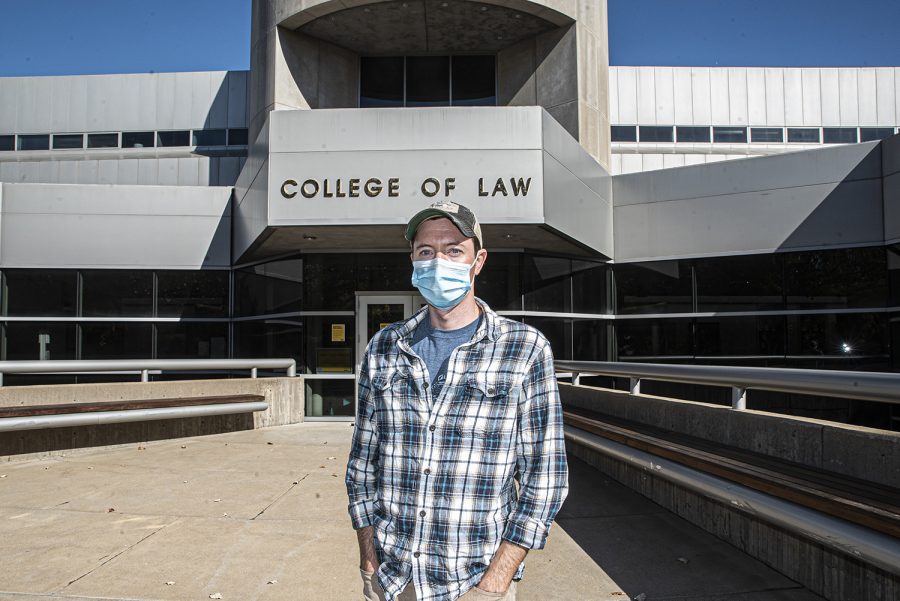Iowa, Drake law students oppose Ernst and Grassley’s decision on Supreme Court nomination
More than 150 students and faculty from the University of Iowa and Drake University signed a letter that was sent Oct. 1, opposing a Supreme Court nomination before Election Day, something Iowa’s senators have supported.
University of Iowa third year law student, Paul Esker poses for a portrait in front of the Boyd Law Building on Wednesday, October 7th, 2020. Esker, along with 176 other law students students and faculty across Iowa’s college of law and Drake’s law school sent letters to Iowa Senators Chuck Grassley and Joni Ernst in support of waiting to appoint a new Supreme Court Justice until after the fall Presidential election.
October 8, 2020
Law students and faculty across the University of Iowa College of Law and Drake University Law School signed an open letter addressed to Sens. Joni Ernst and Chuck Grassley, R-Iowa, asking to hold the Supreme Court appointment until after the general election.
The letter, signed by 176 students and faculty, was sent to the senators on Oct. 1. Both Ernst and Grassley serve on the Senate Judiciary Committee, which would oversee the confirmation process of Amy Coney Barrett — a judge President Trump nominated to fill former Supreme Court Justice Ruth Bader Ginsburg’s seat.
The letter outlines three primary reasons in support of the stay.
The first point in the letter states that supporting the appointment of a new justice on Grassley’s behalf would contradict a statement Grassley made in 2018 when he said he would not consider a Supreme Court nominee from Trump in 2020 if he was still the chairman of the Senate Judiciary Committee.
Grassley is no longer chairman of the committee, and has said it’s up to now-Chairman Sen. Lindsey Graham, R-S.C., to make the decision. He’s also said that in 2016, the presidency and the Senate were controlled by different parties, unlike in 2020.
The second point says a rushed Supreme Court appointment would jeopardize public trust in the court system, and the third point references a statement by Trump, where he said there needs to be nine justices on the Supreme Court by Election Day in case there are problems with the election results.
Third-year UI law student Paul Esker said the open letter originated from conversations with friends on frustrations they shared regarding the appointment process. He said mutual friends connected them with students and faculty at Drake, and it was then they decided to write to Grassley and Ernst.
“There is a really low likelihood that Sen. Grassley or Sen. Ernst even read our letter, so we know that this is really a small thing to do in the grand scheme of things,” Esker said. “But all of us felt a real need to step up and speak out and stand up for the neutrality and legitimacy of the court system.”
He said he received a form letter from Grassley — a pre-written note used to thank constituents for writing to their representatives without addressing the contents of the letter — and nothing from Ernst.
“Senator Ernst did not respond to us at all, which is disappointing to say the least considering the fact that this is a sizable chunk of her constituents speaking out about a very important issue and she couldn’t find the time to respond,” Esker said. “Chuck Grassley couldn’t either, because all his staff did is send us a form letter.”
Second-year Drake University law student Brecklyn Carey worked on the letter with Esker. He said the legislators had not given reasons as to why their stance has changed regarding the appointment of a Supreme Court justice this year.
“What we have seen from Iowa senators is a complete deviation from the promises they made in 2016 and 2018 without really any explanation why that’s the case,” Carey said. “We came together and we wrote this letter and we’re saying, ‘Hey, what’s going on?’ This appears to be a political power grab to make the court unbalanced and politicize it, when that goes against the fundamentals of our justice system.”
Carey said it was important to note that the letter was written before any specific person was nominated for the Supreme Court seat.
“This isn’t about the specific person,” he said. “It really is about the process and how this process is being undermined.”
William Rings, another second-year student at Drake, said appointing a justice so close to the general election could potentially muddle precedent on how situations similar to this one are handled in the future.
“We have a precedent in 2016 that they didn’t nominate a justice, so if we nominate a justice now, that’s kind of overruling the precedent that we set,” Rings said. “It would seem to me that would set a precedent that it really doesn’t matter — as long as you have enough votes — what the process should be or what the process has been.”






